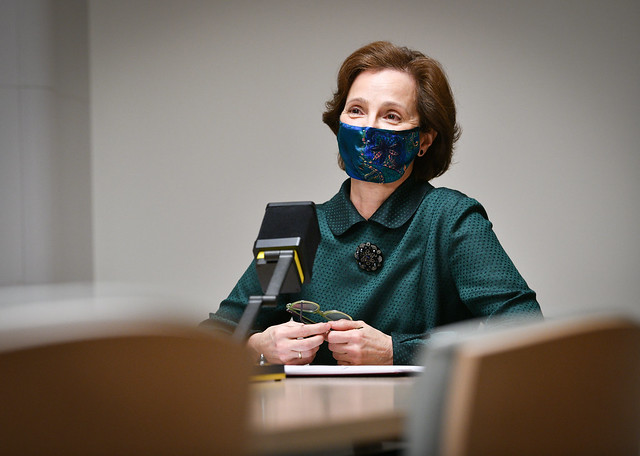Good evening dear organiser, participants and viewers, listeners of tonight’s discussion,
I am truly honoured to be invited here tonight to kick off the expert panel discussion.
First, I want to start by thanking those tens of participants from all over Latvia who took part in Europe-wide survey earlier this year to help identify and unfortunately detect some of those phthalates and phenols that you can find in collected urine samples. Thank you for doing this for us. I am absolutely certain that the samples of those who did not take part in this study would reveal pretty similar concentrations of these substances.
Unfortunately, in medicine a positive test means that particular disease or toxic substance you are tested for has been found in your sample. On an individual level, this can become a big disappointment and lead to some bitter feelings.
So, it is amazing that Zero Waste Latvija, World Wildlife Fund, NPO Green Liberty, Eco-design Competence Centre, Baltic Environmental Forum Latvia have decided to join their forces and shine a spotlight on the invisible (yet pervasive!) ‘enemy’ that surrounds us.
Since the introduction of various kinds of phenols as a raw material for plastic and different phthalates as plastic softeners for our everyday use, our living has become in a way more comfortable (plastic is being used, for example, to wrap the semi-processed food), convenient (bottles/soft drink packaging), colourful (wallpaper), pretty (cosmetics), fun (children’s and adult toys), warmer (floor mats/carpets), cleaner (liquid soap) and even safer in terms of recovering from various accidents (infusion tubes and other medical equipment).
Although we do not have precise statistics, we know for certain that there are plenty of phthalates and phenols around us. They are in our lungs as we breathe. We digest them through our stomachs as we eat. We soak them up through our skin as we apply various creams and even inject them into our blood system together with different medicines.
However, we should not be distraught by this fact. We should not abandon our lives and live as recluses somewhere far away from the rest of the civilised world. That will not help. Wind and water that all people around the world share also carry phthalates and phenols, and some of these phthalates have even been discovered in the Antarctic.
There is only the long and hard way ahead of us. We have to produce sufficient scientific evidence to most likely once again convince the decision and policy makers that phthalates and phenols are really dangerous and harmful to human health.
As scientific research conducted by the world’s most renowned and leading universities suggests, increased levels of phthalates in our body are responsible for loss of fertility in women and men (phthalates act as endocrine disruptors, having similar effects to oestrogen (a hormone) on woman’s body). They can also cause cardiovascular problems, obesity and behavioural disorders (ADHD).
It is much more expensive to try to cure and treat these conditions post factum. It also takes more time and can often lead to poor outcomes.
European Union is an organisation, which is based on democratic legitimacy. It consists of 27 member states that each have a vote. Finding consensus takes time. And even when a joint decision or a law is adopted, it needs some time for transitioning to the new framework. Moreover, European Union and Latvia import products containing phthalates and phenols from all over the world, including countries that have questionable or even non-existing controls on the use of these substances that are well known and documented.
But that does not mean that we are helpless and should rely solely on fate. We can already do the following:
- We must take care of our health by, for example, getting rid of some of those harmful patterns that weaken our immune system and unleash the harmful effects of phthalates and phenols on our bodies.
- All of us, every responsible adult can spare a couple of minutes of our time to read the product labels and stop buying products, which contain these possibly toxic particles.
- More and more companies that produce food and household products have (either voluntarily or under pressure) begun to phase out materials that cause harmful health effects that have been verified in different studies conducted in recent years, which shows what a powerful motivator money can be.
- You do not need to understand chemistry to be able to read a product label, hence developers are offering various apps that can do it for you as you shop.
- People in some future-oriented Latvian cities have opened package free shops where you can by a wide range of different products.
- Traditional markets selling locally sourced seasonal products have decided to ban the use of plastic (apples and potatoes have excellent natural wrapping).
We are not living in an ideal world. There is danger and threats to our life and health everywhere. Human race is currently fighting with, getting infected by and dying from an invisible virus. We are yet to find out why this virus has suddenly become aggressive and deadly. What we do know for sure, however, is that phthalates and phenols have irreversible effects on how our bodies work.
Your efforts help bring this understanding to the Latvian people and get their attention focused on this challenge. You have partner organisations all over Europe and I believe that you will find many allies around the world when it comes to tackling this problem.
I wish you a productive discussion, many useful takeaways and Merry Christmas!





